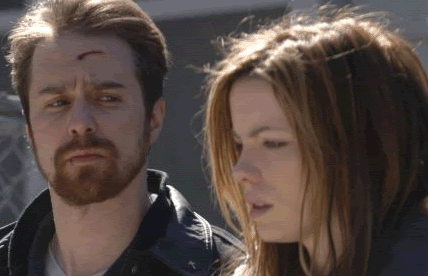Probable Ouroboros

Aside from Paul Thomas Anderson, David Gordon Green is probably the other great young American Director; his "George Washington" found itself on several top ten lists years ago and his films "Undertow" and "All The Real Girls" rest comfortably in my DVD collection. Now, after months of being delayed, his latest film "Snow Angels" is in theatres. Let's begin.
I watched the film in a crowded auditorium, accompanied by some close friends who were not familiar with Green's work. When the house lights came up at the film's closing credits, one of them said to me: "Great performances, but a real shitty plot. You know everything that was going to happen from the outset."
His statement is accurate; the plot is nothing groundbreaking, nor are the actions done by certain characters at the film's end are entirely ironic or unpredictable. Everything everybody does in the film is inflicted by either personal pain, or by personal redemption. There are winners and losers, you could say.
But, I do believe my friend was incorrect in downplaying the film altogether. This is the first, least-polarizing great movie of the year. I still treasure "Funny Games" but at least here, there's no taunting of the audience before a character is killed. And to respond to my friend's feelings toward the notion of plot, well, Green has never been much for spinning a yarn; rather he is interested in what goes on in each scene, with the motivations of characters' feelings or their unspoken back history. Other Directors build and build to an exciting conclusion, that either pulls the rug from under you or just makes you cheer. Green is more of an academic, savoring those missed moments in narrative fiction. Think of a favorite scene in J.D. Salinger's The Catcher In The Rye, like Holden's examination of "bitches" sitting in a room waiting, and his scathing inner thoughts. Green could probably shoot that scene in such a lyrical way, it would be empty of sarcastic laughs and full of bruising insight. "Snow Angels" is that film; it's looking at small town individuals, who don't care about the last home high school football game, nor do they treasure their underwhelming jobs. They just want geniune human connections, free of expectations and of past demons. Green places you inside their homes, in the back kitchens of their waitressing job, in the bedrooms where they pray and in the motel room where they sleep with their friend's husband.
The lead role is played by the great Sam Rockwell ("Confessions of a Dangerous Mind"), and requires some raw power from its star. As a born-again Christian, Rockwell sidesteps the usual nutso religious freak prototype (see Marcia Gay Harden in "The Mist"), and delivers a performance that is both heartbreaking and frightening. Not in the way to make you gasp, but in the gut reactions it gets from you, by playing it straight-faced. You may not agree with what Rockwell's character does at the end of the film, but you cannot think of an alternate path or chain of events that would stay faithful to his arc. Nothing in these characters' actions can be labeled unnecessary. They are natural.
Since the plot is not much for unraveling, I'll spare you the setup, in order to better appreciate the filmmaking. I will however make you sit up and note some particular moments: there's the quiet kissings between two high school characters in a bedroom, that's sublime. Notice Tim Orr's placement of the camera just over the shoulder and then away, while Rockwell speaks to a higher power in private. Savor the bleakness of a detective's routine questioning; it's not glammed up to tone the likes of TV cop dramas. In fact it reminded me of the investigation passages of Steven Soderbergh's masterful "Bubble." People have these jobs, and everyday can't be acted out in glory.
Of course, by now you might be frustrated with this Select Cinema entry. You are no closer to knowing what the movie is about since you started reading. That's okay. After you watch it, I'll ask you to consider the title I chose for this entry. Think about the parallels between the doomed, older ex-high school sweethearts, and the newly blossoming romance that unfolds. Would you say Green is implying that these small town characters are ultimately Greek in their nature? Are the teens in just as much peril of growing up, only to grow violently apart?
Oh, and look. A discussion has arose.
It's what Green does. He's not interested in Act I, II, and III. He's interested in the passages. He's interested in the beats between the spoken dialogue. Green has confidence in his audience. They can draw their own outlines and values.
Okay. Now go see it.








